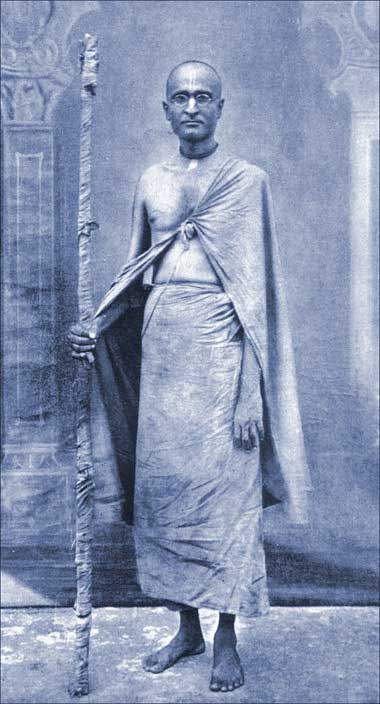śrī śrī guru gaurāṅga jayataḥ!
Year 8, Issue 7 Dedicated to Śrī Śrīmad Bhakti Prajñāna Keśava Gosvāmī Mahārāja Śrī Śrīmad Bhaktivedānta Nārāyaṇa Gosvāmī Mahārāja
Posted: 5 August 2015
nitya-līlā praviṣṭa oṁ viṣṇupāda
Inspired by and under the guidance of
nitya-līlā praviṣṭa oṁ viṣṇupāda
Personality of Godhead - Part One
by Śrīla Bhaktisiddhānta Sarasvatī Ṭhākura Prabhupāda

The difference between dharma and adharma lies in the admission or denial of the Personality of Godhead.*
______________
* A loose translation of the word dharma is ‘intrinsic religion,’ which refers to ‘right living’ in accordance with the absolute good of all living beings and especially the Supreme Being. The word adharma refers to the negation of the same.
There are different ways of denying the Personality of Godhead. We hope to examine that aspect of the issue elsewhere. Our present topic is the Personality of Godhead. We therefore assume that those who accept the existence of the Personality of Godhead do not necessarily agree with one another. It is our purpose to trace out the differences found among them.
Śrīmad-Bhāgavatam has explained the function of dharma in a way that is difficult to misunderstand. The function of all unalloyed souls is defined in Śrīmad-Bhāgavatam as consisting of activities that promote devotion to the Transcendental Person (Śrīmad-Bhāgavatam 1.2.6*).
______________
* “Sa vai puṁsāṁ paro dharmo yato bhaktir adhokṣaje, ahaituky apratihatā yayātmā suprasīdati – The supreme dharma for human society is pure bhakti to Adhokṣaja, the Supreme Lord, who exists beyond mundane sense-perception. This devotion must be free of ulterior motives and practiced constantly to completely satisfy the self.”
Divinity has His own name. He is Hari. The word Hari expresses the absence of all references to mundane qualities. There are those who misjudge the true nature of the Divine Personality under the influence of imperfect thought. As long as their thoughts are not perfectly immune to mundane references, these individuals do not possess sound spiritual judgement.
We cannot praise such deliberate perversity of judgement. That which is contemplated by man with the help of his eyes, ears, nose, tongue and skin is not God. If we are asked to define God, we should say, “Godhead is He who reserves the right to remain hidden to human senses.” It is this Entity who is called Adhokṣaja (Godhead beyond the senses), Hari, Kṛṣṇa or Rāma.
We must once and for all cease from deliberately ignoring or trying to diminish the Supreme, who mistaken men refer to with misused words and patterns of thought born of sense perception. It is unfortunate that such references are currently circulating within the societies of mankind.
Nothing short of this is required by the definition of dharma provided in Śrīmad-Bhāgavatam. The moment we choose to think of God as an object of mundane thought, like earth, stone, or water, we become idolaters.
We do not subscribe to the way in which Hindus, Mohammedans, Christians and others have been endeavouring to set forth their respective contentious views. And the obsolete quarrel between some groups of Śaktas and Vaiṣṇavas has no bearing on the subject matter of our preaching. Our words will never die as long as time endures, or in fact, even after time itself has ceased to function.
The fact is that once a person becomes truly conversant with the message of Śrī Caitanyadeva, about the function of transcendental love, all petty narrowness is eliminated once and for all.
And regarding contentions around idolatry, if the so-called stone image of God is broken, an entity completely unlike Him – a vacuum – will take its place. If this subject matter is handled by mundane human intellect, worship of God’s form is sure to be cast as idolatry.
It is, of course improper to conceive of the Supreme Entity of Godhead as confined to a finite object that can be comprehended or possessed by our defective senses. It is equally poor judgement that seeks to dismantle God or to deprive Him of His own absolute existence. He is the all-pervading entity. If He is affirmed to be powerless, His supremacy is denied.
There is another way in which our conception of the figure and function of Divinity can be mangled. There are those who make it a point to insist that the final flavour of worshipping the Divine is one of reverence. Although they admit that the full transcendental figure of the Divine Person is real, they declare that it is only proper to serve those limbs of the divine form that are suitable for a reverential, platonic relationship. Accordingly, they insist that service to the Divine Form be confined to the limbs above the navel.
But such vision excludes the moods of parent-hood, consort-hood and friend-hood toward Godhead. Their arguments in favour of preferring their particular mode of worship casts God as an imperfect entity.
Adapted from The Gaudiya, Volume 45, Number 10
by the Rays of The Harmonist team